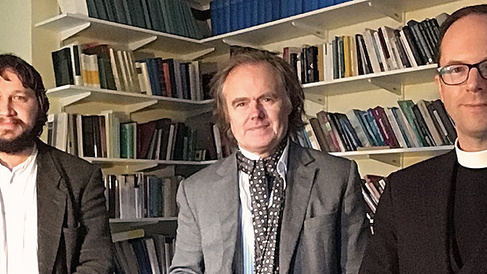
New Interfaith Research Project funded by the Spalding Trust
Can Platonic metaphysics bridge the perceived gap between faith and reason? Much popular secular rhetoric opines that the two are irreconcilable both for Christians and, more pointedly, in the case of Islam. Media commentators regularly pillory the latter for “mediaeval” attitudes and exceptionalism; yet one aspect of the Middle Ages was the sophisticated philosophical interaction between scholars of the Abrahamic faiths, on the basis of a shared, broadly Platonic tradition.
From time to time, popular articles commend Averroes as a precursor to the European Enlightenment and rue his lack of influence in the Islamic world. Even some academic publications continue to perpetuate the myth of the death of Islamic philosophy after the pyrrhic victory of the famous opponent of ‘the philosophers’, Al-Ghazālī. Yet even as theology and philosophy bifurcated in the Christian West under Averroes’ influence, philosophical theologians in Andalusia, the Ottoman and Mughal worlds, and later, Iran, were very deliberately uniting the two in the grand Platonic tradition. This Platonising turn influenced al-Ghazālī himself and some post-Rāzian kalām theology, but really came to fruition in the ‘Akbarian’ school of Ibn Arabi and the Illuminationism of Suhrawardi. While these varied in their use and approval of the term ‘philosophy’ to describe their work, they widely acknowledged Plato as having derived his knowledge from a genuine prophetic source.
Judging philosophy solely on the criterion of the Aristotelian immanentism which had been imported from Avicenna and Averroes, European philosophers and theologians came to find Islamic thought wanting. Their own relegation of Platonism, particularly in its Proclean and Pythagorean streams, to the realms of mystical fancy and superstition has lent weight to today’s attribution of irrationality and fideism to Islam, as indicated by the pejorative use of the term “mediaeval." Yet it was precisely in the commitment to Platonic metaphysical exemplarism as opposed to Averroistic Aristotelian immanentism, that Mulla Fenari could find “harmony between reason and revealed religion.”
The project focusses first on disputed questions about the divine will and, connected with this, the metaphysics of intermediary beings between creator and creation through select texts of Neoplatonists, Christian Platonists and the Akbarian, Suhrawardian and higher kalām traditions of Islam. Metaphysical answers to the questions of voluntarism, fideism and the inherent value of the cosmos will feed into wider contemporary cultural concerns about the role of religion in politics, the nature of religious belief, and environmentalism.
Under the oversight of Professor Douglas Hedley, the project will be coordinated by the Rev’d Dr Thomas Plant, who returns to Cambridge eight years after completion of his doctorate on the comparative metaphysical thought of Dionysius and the Buddhist Shinran Shonin. His co-researcher Hasan Spiker, a traditionally trained Muslim theologian, spent twelve years studying the Islamic intellectual sciences in Morocco, Turkey and Jordan, where he also completed his memorisation of the Qur’an. During this time he studied with a number of teachers, including the Iraqi sage Sayyid Quṣayy Abū Siʿd, one of the few remaining masters of the Ottoman and Kurdish ʿaqliyyāt curricula in their fullnesses, and an expert in the works of Ibn ʿArabī. A second-generation Anglo-American Muslim, Spiker holds a BA in philosophy from the University of London, and an MPhil in Philosophical Theology from the University of Cambridge, where he is also currently completing a doctorate. Amongst other works, he is the author of Things As They Are: Nafs al-amr and the Metaphysical Foundations of Objective Truth.
The Spalding Trust has generously provided initial funding for this project.
